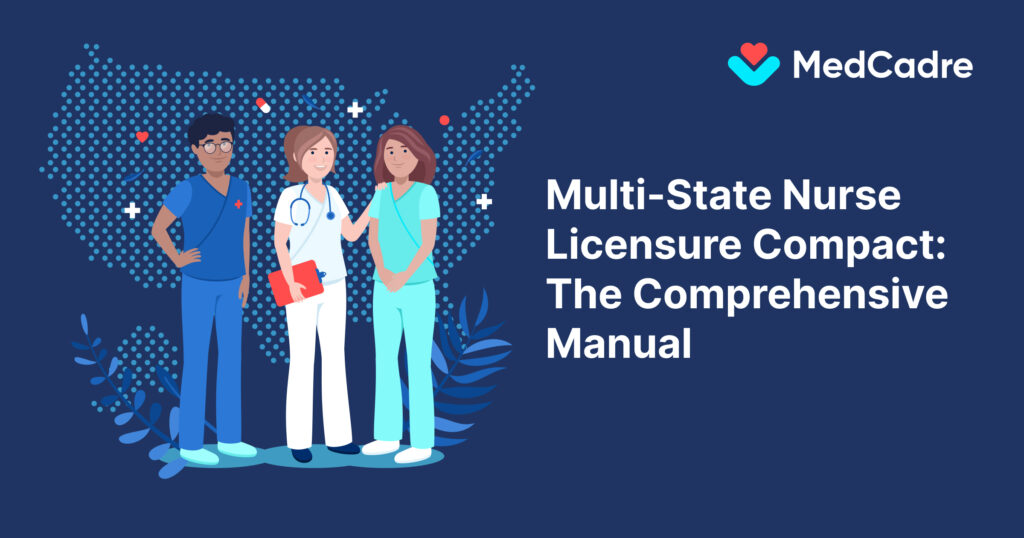Over the years, the field of nursing has undergone transformative changes, and one of the most significant shifts is the establishment of the Multi-State Nurse Licensure Compact (NLC). As healthcare needs transcend state boundaries, this compact addresses the demand for streamlined multi-state licensure for nursing procedures. This article delves into the depths of this complex system, unraveling its intricacies and illuminating its benefits.
You will learn:
- What is a multi state nursing license?
- Requirements for Nurse Licensure Compact in USA
- NLC application process in detail
- List of states included in multi-state nursing licensure
- Benefits of Nurse Licensure Compact
- Frequently asked questions about NLC
What is a multistate nursing license? Definition of NLC
A multistate nursing license is a special type of nursing license that allows nurses to work in multiple states without needing separate licenses for each state. It’s like having one powerful license that works in different places. This special license is made possible by something called the Nurse Licensure Compact, or NLC.
The Nurse Licensure Compact (NLC) is an agreement between many states in the United States. This agreement lets nurses who have a license from one of these states also practice in the other participating states. So, if you have a multistate nursing license from a state that’s part of the NLC, you can use that license to work as a nurse in any other NLC state without needing to get a new license there.
In simple terms, a multistate nursing license and the NLC are like magic key that let nurses unlock doors to work in many different states without needing lots of different keys (licenses). It’s a helpful way to make nursing work easier and more flexible, especially when nurses want to help people in different parts of the country.
Requirements for nurse licensure compact
Education requirements
Nursing education lays the foundation for competent and compassionate patient care. Eligibility for compact licensure requires nurses to have graduated from an approved nursing education program that aligns with the standards set by the Nurse Licensure Compact. This criterion ensures that nurses possess the necessary knowledge and skills to deliver quality care across state lines.
Primary state of residency (PSOR)
Your primary state of residency serves as the cornerstone of the compact licensure process. This is the state you consider your main home, where you have an established residence, and where you intend to spend most of your time. Your primary state of residency is your point of entry into the world of multi-state nursing practice.
License in a compact State
The first step on the path to compact licensure is to hold a nursing license from a state that is part of the Nurse Licensure Compact. Currently, more than half of the states in the United States have embraced the compact, offering nurses the privilege of obtaining this special license. If your home state is one of these compact states, you’re already on the right track.
Passing the background check
Patient safety is paramount in nursing, and the compact takes this seriously. As part of the eligibility criteria, nurses must pass a background check. This comprehensive review ensures that the nurse’s history is free from serious legal issues or activities that could compromise patient’s well-being.
No major legal issues, a clean record
Nursing is a profession of trust and responsibility. To maintain the integrity of the compact licensure, nurses must have a clean legal record. Major legal issues, such as felonies or certain serious offenses, may render a nurse ineligible for the multistate license. This requirement safeguards patient safety and upholds the ethical standards of the nursing profession.
Meet health standards
The physical demands of nursing are well-known, and nurses need to be in good health to provide effective care. Eligibility for compact licensure includes meeting health standards to ensure that nurses can fulfill their responsibilities without compromising their well-being or the well-being of their patients.
How to apply for a multistate nursing license? NLC application process
Step 1: Check eligibility
Make sure you meet the eligibility requirements. You need to hold an active nursing license in your home state, and must also be a member of the NLC. Additionally, your primary residence should be in the NLC state.
Step 2: Gather the required documents
Collect the necessary documents. This usually includes a copy of your current nursing license, government-issued identification (like your driver’s license), and proof of residency in your home NLC state.
Step 3: Visit your state’s nursing board website
Go to the official website of your state’s Board of Nursing (BON). Look for the section related to the Nurse Licensure Compact. This section will provide you with detailed information about applying for a multistate nursing license. Click here to locate your state BON website
Step 4: Complete the application form
Download or access the multistate nursing license application form. Fill it out accurately and thoroughly. This form collects important information about you, your nursing credentials, and your intended use of the multistate license.
Step 5: Pay the application fee
There might be an application fee associated with obtaining a multistate nursing license. This fee covers administrative costs and helps maintain the NLC system. Follow the instructions provided to submit the payment.
Step 6: Submit your application
Once your application is completed and your fee is paid, submit your application through the online platform or mailing address provided on the nursing board’s website. Double-check that all the required documents are included.
Step 7: Verification and processing
The nursing board will review your application and documents for accuracy. They may also perform background checks and verify your nursing license. This step ensures that only qualified and eligible nurses receive the multistate license.
Step 8: Receive your multistate nursing license
Upon approval, you’ll receive your multistate nursing license. This license allows you to practice nursing in any NLC state without needing additional licenses. It’s like having a master key that opens doors across multiple states.
Step 9: Keep your license updated
Like any professional license, your multistate nursing license needs to be renewed periodically. Be sure to keep track of renewal dates and follow the renewal process according to your home state’s requirements.
List of states included in multi-state nursing licensure
As of August 2023, a total of 41 states are actively taking part in the NLC, and you can find the comprehensive NLC map provided right under this information. According to a report from the National Council of State Boards of Nursing, starting from September 5th, 2023, Pennsylvania will open its doors to nurses holding multistate licenses, enabling them to start their practice within the state.

| Jurisdiction | NLC status |
| Alabama | NLC State |
| Alaska | Pending Legislation |
| Arizona | NLC State |
| Arkansas | NLC State |
| California | Non-NLC State |
| Colorado | NLC State |
| Connecticut | Non-NLC State |
| Delaware | NLC State |
| District of Columbia | Non-NLC State |
| Florida | NLC State |
| Georgia | NLC State |
| Guam | Partial NLC Implementation |
| Hawaii | Non-NLC State |
| Idaho | NLC State |
| Illinois | Pending Legislation |
| Indiana | NLC State |
| Iowa | NLC State |
| Kansas | NLC State |
| Kentucky | NLC State |
| Louisiana | NLC State |
| Maine | NLC State |
| Maryland | NLC State |
| Massachusetts | Pending Legislation |
| Michigan | Pending Legislation |
| Minnesota | Pending Legislation |
| Mississippi | NLC State |
| Missouri | NLC State |
| Montana | NLC State |
| Nebraska | NLC State |
| Nevada | Non-NLC State |
| New Hampshire | NLC State |
| New Jersey | NLC State |
| New Mexico | NLC State |
| New York | Pending Legislation |
| North Carolina | NLC State |
| North Dakota | NLC State |
| Ohio | NLC State |
| Oklahoma | NLC State |
| Oregon | Non-NLC State |
| Pennsylvania | Enacted NLC: Awaiting NLC Implementation |
| Rhode Island | Enacted NLC: Awaiting NLC Implementation |
| South Carolina | NLC State |
| South Dakota | NLC State |
| Tennessee | NLC State |
| Texas | NLC State |
| Utah | NLC State |
| Vermont | NLC State |
| Virgin Islands | Enacted NLC: Awaiting NLC Implementation |
| Virginia | NLC State |
| Washington | Pending Legislation |
| West Virginia | NLC State |
| Wisconsin | NLC State |
| Wyoming | NLC State |
8 Benefits of nurse licensure compact
Multistate nursing license is important for registered nurses, nursing assistants, nurse practitioners and any travel providers in nursing. Let’s get into the details of the advantages that this license brings to healthcare.
1. Mobility beyond borders
The NLC transcends geographical constraints. Nurses holding a multistate license can seamlessly practice in any participating state without the need for additional licenses. This mobility is a game-changer, empowering nurses to reach patients where their care is needed the most. From bustling urban centers to remote rural areas, the compact grants nurses the power to answer the call of healthcare without delay.
2. Rapid response to healthcare needs
The flexible nature of the Nurse Licensure Compact is a boon during times of crisis. Natural disasters, public health emergencies, or sudden spikes in patient demand often require a swift response from healthcare providers. Nurses with multistate licenses can step in promptly, providing essential care where it’s urgently needed. This agility translates into enhanced patient outcomes and strengthened healthcare resilience.
3. Fostering collaboration and expertise exchange
Healthcare challenges are rarely confined to a single state’s borders. By enabling nurses to practice across state lines, the NLC fosters the sharing of expertise, knowledge, and best practices. This interdisciplinary collaboration contributes to a richer healthcare ecosystem, where innovative solutions can be readily shared and implemented, ultimately benefiting patient care on a larger scale.
4. Addressing healthcare disparities
Healthcare disparities are a pressing concern, particularly in underserved areas. The Nurse Licensure Compact acts as a bridge, connecting nurses with areas that lack sufficient healthcare resources. Nurses holding multistate licenses can play a pivotal role in bridging these gaps, ensuring that patients in remote or underserved regions receive the same level of care as those in well-equipped healthcare hubs.
5. Facilitating telehealth and digital healthcare
The digital age has ushered in a new era of healthcare provision, with telehealth at the forefront. The NLC aligns perfectly with this trend, as nurses can leverage their multistate licenses to engage in virtual patient care across state lines. This not only enhances access to healthcare but also promotes the integration of technology in nursing practice.
6. Empowering travel nursing
The allure of travel combined with the commitment to healthcare is a powerful combination. Nurses with multistate licenses can embrace the world of travel nursing, exploring new places while lending their expertise to various healthcare settings. This enriching experience benefits both nurses and the healthcare organizations they serve.
7. Simplifying licensing processes
Gone are the days of navigating a maze of paperwork for each state’s nursing license. The NLC streamlines the licensing process, reducing administrative burdens on nurses. This efficient approach allows nurses to focus more on patient care and professional growth rather than getting entangled in bureaucratic red tape.
8. Enhancing workforce flexibility
Healthcare demands can be unpredictable, requiring nimble adjustments in staffing. Nurses with multistate licenses enhance workforce flexibility, enabling healthcare facilities to address surges in patient numbers without delay. This adaptability contributes to better patient care and optimized healthcare services.
Frequently asked questions (FAQs) – Multistate nursing license
1. What is a multistate nursing license?
A multistate nursing license, also known as a compact nursing license, allows registered nurses (RNs) to practice in multiple states without obtaining additional licenses. It’s particularly useful for nurses working in telehealth or traveling roles.
2. How does the multistate nursing license work?
The multistate nursing license is issued by the Nurse Licensure Compact (NLC) member states. Once you hold a license in your primary state of residence (home state), you can practice in other compact states without additional licenses.
3. What is the difference between a compact license and a multistate license?
A compact license and a multistate license are often used interchangeably. Both refer to the same concept, which allows nurses to practice across multiple states within the Nurse Licensure Compact (NLC) member states.
4. Which states are part of the Nurse Licensure Compact (NLC)?
As of my last update in September 2023, over 41 states were part of the NLC. It’s advisable to check the current list of compact states, as participation may change over time.
5. Which states are not part of the nurse licensure compact?
According to the NCSBN, Alaska, Illinois, Massachusetts, Michigan, Minnesota, New York, Rhode Island, and Washington are currently considering legislation to become part of the Nursing Licensure Compact (NLC) states. On the other hand, California, Connecticut, the District of Columbia, Hawaii, Nevada, and Oregon have chosen not to participate and do not currently have any pending legislation related to this matter.
6. Do all nurses qualify for a multistate nursing license?
To qualify, you must have a valid RN license in your primary state of residence. You must also meet certain eligibility criteria, including passing a background check.
7. How do I apply for a multistate nursing license?
Apply through your state’s nursing board. They will verify your eligibility and issue the multistate license if you meet the requirements.
8. How long does it take to get a multistate nursing license?
The processing time for obtaining a multistate nursing license varies by state. It generally takes a few weeks to a few months, depending on factors like application volume and verification processes.
9. Can I switch my primary state of residence if I have a multistate license?
Yes, you can change your primary state of residence, but you must apply for a new license in the new home state. Your multistate privilege will follow the rules of the new home state’s compact agreement.
10. What if my home state is not part of the Nurse Licensure Compact?
If your home state is not part of the compact, you can still apply for a single-state license in that state. However, you won’t have the privilege to practice in other compact states with the same license.
Final thoughts
In conclusion, this detailed informative article serves as an invaluable guide for nurses to navigate through multistate licensure. As healthcare continues to evolve, the compact offers a streamlined pathway for registered nurses to practice with flexibility and mobility across participating states. Through this manual, nurses gain not only a deep understanding of the compact’s principles and benefits but also practical insights into the application process, eligibility criteria, and the latest developments in compact state membership.


